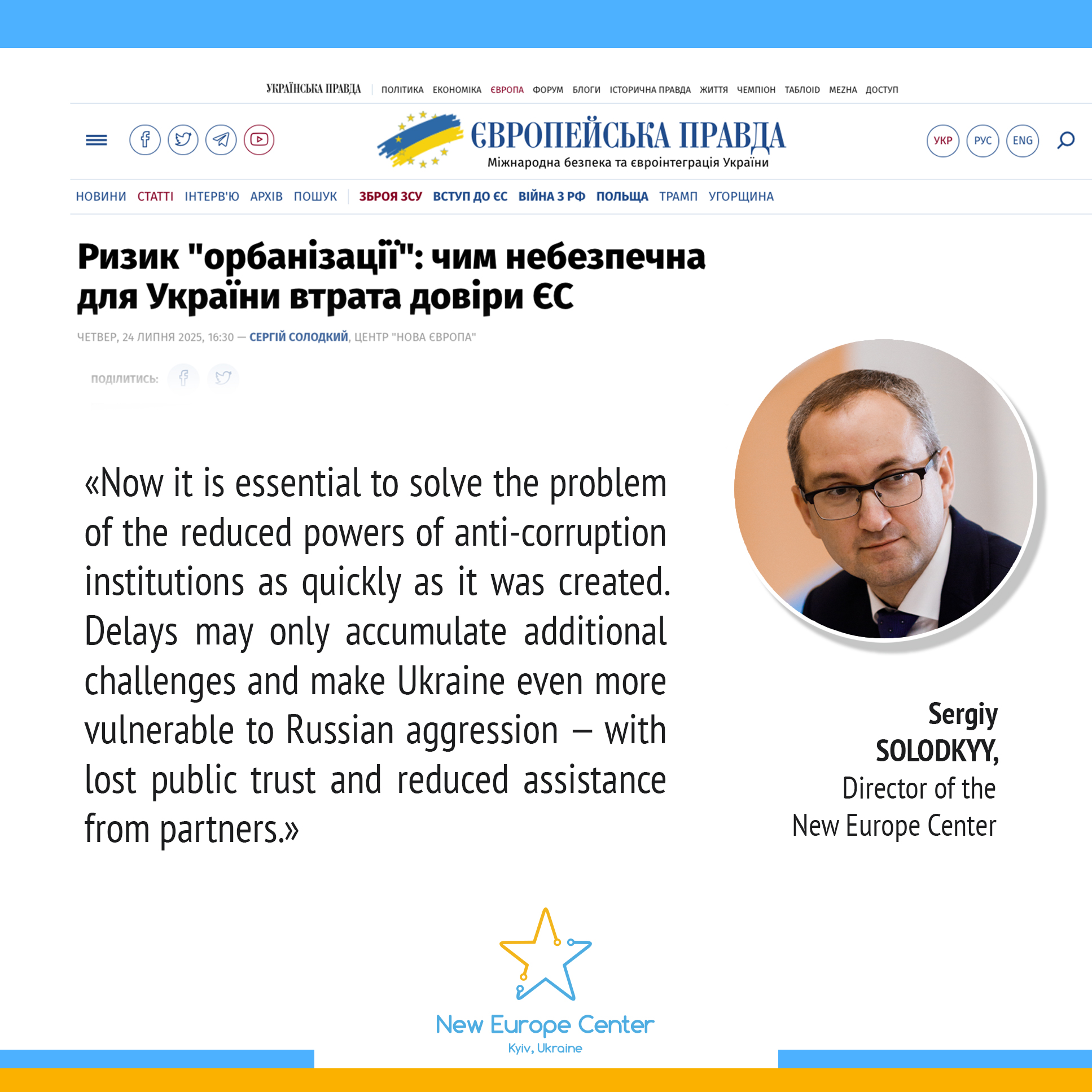
Five years ago, the New Europe Center published a large-scale study titled “Ukraine’s regional “soft power”. Changes during the presidency of Volodymyr Zelenskyy”. We analyzed how attitudes toward Ukraine had changed under the new president in a number of post-Soviet countries — Belarus, Georgia, Moldova, Kazakhstan, and Russia. Democracy was identified as Ukraine’s main strength: “Only a democratic Ukraine can become an alternative to the Kremlin and all other authoritarian regimes in the post-Soviet space.” Another conclusion: “The Ukrainian president’s anti-corruption rhetoric strengthens the image of Ukraine as a country striving for democratic change.”
Five years later, global media are publishing concerned articles about the weakening of anti-corruption institutions, which had become an integral part of Ukraine’s democratic image.
In our five-year-old study, many experts from the former Soviet republics expressed a kind of envy: Ukrainians are doing the impossible — this is who should be emulated! A logical conclusion of our research was the idea that Ukraine has the potential to become an alternative center of gravity to Moscow and an attractive model of development for the populations of other post-Soviet states.
Undoubtedly, this was understood by the undemocratic regimes of some of the studied countries. That is why Belarusian propaganda always frightened its citizens with “Ukrainian chaos”: look where so-called democracy leads — to instability and war. This argument is still popular among pro-Russian politicians in Georgia and Moldova.
The Russian authorities declared war on Ukraine’s democratic development immediately after the Orange Revolution — Putin relentlessly frightened Russians with the “orange threat.” The Kremlin made no secret of the fact that a democratic Ukraine, which dares to rise up against the president, reform itself, and change power through elections, poses an existential threat to the Russian state — in reality, to the Putin regime. When the Russian elite proved unable to suppress Ukrainian democracy through bribery, intimidation, or puppet politicians, they resorted to open military aggression. Putin could not allow Ukraine to set a dangerous example for the Russian part of the “one people”: if Ukrainians can change their government, why can’t Russians? If Ukrainians can succeed without dictatorship, why shouldn’t Russians try?
The war of dictatorships against democracy is the war of Russia, China, North Korea, and Iran against Ukraine and the rest of the democratic world. This is the global context of what is the bloodiest war in Europe since World War II. This argument enabled Ukrainians to rally the support of the democratic world — from Canada to Japan, from the United States to Taiwan. Saving Ukrainian democracy was what mobilized the efforts of the democratic world to assist Ukraine; it was what inspired admiration and sincere support in many parts of the world. Analysts at our Center were repeatedly asked by foreign colleagues: how is it possible to preserve democratic freedoms during wartime?
Of course, a country at war cannot be a model of democracy. Probably that’s why foreign observers were not as demanding or critical of Ukraine’s ambiguous decisions, often pointed out by the opposition. EU diplomats likely felt a certain sense of guilt, since after Russia’s aggression began in 2014, they focused on civilian aid to Ukraine while ignoring defense and security issues. Thus, they were partly understanding when the government implemented reforms in a limited format during wartime.
Perhaps those in power expected the West to turn a blind eye to new decisions affecting key anti-corruption institutions. To some extent, that expectation may be justified — everyone who has supported Ukraine and helped Ukrainians will likely continue to do so — the threat from Russia is simply too great. However, it will now be more difficult for our partners to respond to accusations of curtailing anti-corruption efforts and the strengthening of authoritarian trends in the country.
The international damage of recent decisions may turn out to be greater than it seems. The new U.S. administration does indeed place less emphasis on reforms in Ukraine. But does that mean Ukraine’s opponents in Washington won’t exploit recent developments? After all, during the U.S. election campaign, this was one of the most widespread arguments: corrupt Ukraine is embezzling all the aid. The EU accession process was already facing extraordinary challenges due to Hungary’s blocking. Yet Ukrainians were able to appeal to the influential capitals of EU countries: don’t let the Hungarian government, which doesn’t share European values, abuse EU procedures — after all, Ukraine is diligently fulfilling all its European integration obligations.
But how can we now respond to skeptical Germans and French citizens who question the need for rapid EU expansion: “Where are the guarantees that we won’t get a new Hungary in the EU?” The so-called “Orbanization” of Ukraine is seen as one of the main concerns among democratic European politicians. Previously, Ukrainians could clearly counter such accusations: the main guarantee that Ukraine would not follow Hungary’s path was a strong civil society and a government that listens to the voice of the non-governmental sector. President Zelenskyy’s promise to strengthen the independence of anti-corruption bodies showed that citizens’ voices still matter.
Now it is essential to solve the problem as quickly as it was created. Delays may only accumulate additional challenges and make Ukraine even more vulnerable to Russian aggression — with lost public trust and reduced assistance from partners.







